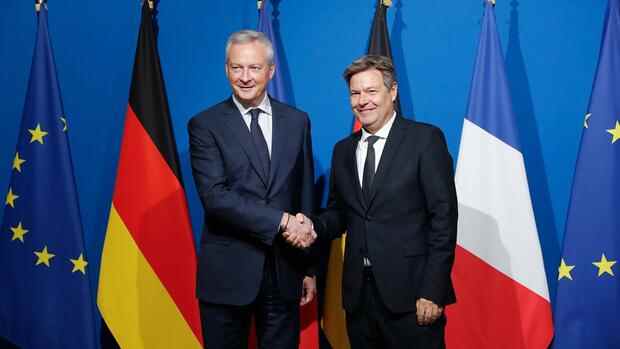“First step of a new Franco-German commitment to advance European industrial policy.”
(Photo: IMAGO/PanoramaC)
Paris Germany and France are making further efforts to clear up recent irritations in their relations. After the visits by Foreign Minister Annalena Baerbock and Economics Minister Robert Habeck (both Greens) at the beginning of the week, Finance Minister Christian Lindner (FDP) is expected in Paris on Thursday. On Friday, French Prime Minister Élisabeth Borne will travel to Chancellor Olaf Scholz (SPD) in Berlin.
According to current plans, the Franco-German Council of Ministers, which was canceled at the end of October, is to take place on January 22 to mark the 60th anniversary of the Élysée Treaty between the two countries. By then, the disagreements, especially in energy and defense policy, should have been resolved. However, there is no official confirmation of the date yet.
Both countries recently made progress in the joint development of the FCAS combat aircraft system. According to government information from Paris and Berlin, the conclusion of an agreement between the armaments division of the European Airbus group and the French aircraft manufacturer Dassault is imminent so that the project can enter the next development phase.
Apparently, not all hurdles have been cleared: Dassault boss Éric Trappier spoke of a “political pseudo-announcement”. The topic is “not quite settled,” he told radio station RTL.
Top jobs of the day
Find the best jobs now and
be notified by email.
French criticism of the federal government’s €200 billion energy crisis package has now died down. A competition-distorting subsidy for the German economy was also suspected to be behind the aid package due to unclear communication from Berlin.
In Paris, the realization has prevailed that France mobilizes the same sum for the support of companies and households in relation to economic power. However, there are still differences between the two countries as to whether and how wholesale gas prices in the EU should be capped.
>> Read here: Why Europe’s new gas price cap isn’t one
Germany and France agreed on Tuesday to work more closely together on strategically important key technologies such as hydrogen technology, battery cell production and the healthcare sector. Both countries also want to cooperate in securing raw materials in order to make the European Union independent.
A new European platform for transformation technologies is also to be set up in order to strengthen Europe’s innovative power. In a joint statement on Tuesday, Habeck and French Economics and Finance Minister Bruno Le Maire spoke of a “first step in a new Franco-German commitment to advancing European industrial policy”.
The Federal Foreign Minister also met with French President Emmanuel Macron.
(Photo: dpa)
Like Baerbock on Monday, Habeck was received by President Emmanuel Macron for an exchange at the Élysée Palace. The fact that the head of state is receiving foreign ministers is unusual in terms of protocol and indicates the need for talks.
According to information from Paris, the meeting between Lindner and Le Maire on Thursday will deal, among other things, with future debt regulations in the EU. The reform of the stability pact threatens to become a new topic of conflict: Germany is opposed to the fact that the rules for reducing deficits and government debt in the euro zone are being relaxed too much.
More: Scholz meets Macron – Played harmony, but not even a statement
